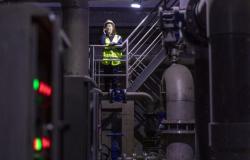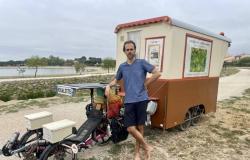The curse of black gold
“We are clear, these revenues cannot transform Senegal into the new Qatar,” we believe within Petrosen. But this financial windfall can boost the country’s economic development, through investments in key sectors, such as energy. » Even if exports are planned, a part of oil production will be devoted to local consumption.
Enough to arouse celebration and hope in the land of teranga (“hospitality” in Wolof). Especially since GDP growth projections are favorable: 7.1% in 2024, according to the International Monetary Fund and 10% in 2025, compared to 4.6% in 2023. However, mistrust is just as great.
The curse of black gold is on everyone’s mind. Starting with that of the new president, Bassirou Diomaye Faye, elected on March 24, one of whose promises was the renegotiation of hydrocarbon contracts, which he considers “very unfavorable.” to his country. In the past, the current Prime Minister, Ousmane Sonko, has repeatedly denounced agreements that harm Senegal, “which will only receive 10% of the profits generated by hydrocarbon production.”
Senegal knew how to “take advantage of the mistakes of others”
A percentage already revised to 18%, which represents the fixed share of profit of the public company Petrosen. And to which must be added the taxes and duties paid by the oil companies and suppliers as well as the surface rents. If it is always possible to renegotiate all of these contracts, the experts consider this option risky. For Gacyen Mouely Mouanga, director of the firm 3M-Partners & Conseils, “A positive outcome is not guaranteed, it can create uncertainty, generate a bad business climate and discourage long-term investment in Senegal.”
Since coming to power, the Faye-Sonko duo has been more realistic than during the election campaign. And the subject has been put on hold while audits are launched. “Ideally, we would like to renegotiate, but our limit will be business,” says an advisor to the presidential palace.
To avoid the monopolization of its precious resources, Senegal undertook reforms well before the electoral deadlines and the start of production. “Being among the last to arrive in the race, the country was able to take advantage of the mistakes of others,” said Papa Fara Diallo, teacher-researcher at Gaston Berger University in Dakar and president of the Publish What You Pay/ organization. Senegal, for a fair and equitable energy transition.
A sovereign investment fund
Since 2013, more than ten texts have been adopted with the objectives of “transparency and especially redistribution”. The 2022 law on the distribution and supervision of income management provides that a maximum of 90% of profits will be allocated to the general budget, while a minimum of 10% will be reserved for the Intergenerational Fund.
A sovereign investment vehicle modeled on the Norwegian model, which should enable massive investment in education and new technologies. “The existence of this fund is effective, it remains to be seen how it will operate, who will direct it and with what room for maneuver,” underlines Abdoulaye Ba, program manager at the Natural Resource Governance Institute in Senegal. Note that the Norwegian sovereign fund, created in the 1990s, today represents a jackpot of more than 1,500 billion euros. We are very far from it, but there is something to dream about.
Laws to regulate the extractive sector
Another essential reform: the law on the development of local content. Voted in 2019, it is supposed to allow Senegalese companies to acquire market shares through exclusive or mixed subcontracting contracts, in all sectors that are closely or remotely related to the oil and gas industry.
“In the long term, the challenge for Senegal is to focus on local content for a sustainable and significant impact on development,” emphasizes Papa Fara Diallo. But the mechanism has yet to prove itself, because while the legislation exists, adequate goods and services are lacking.
Read alsoSenegal’s presidential election: political lessons from a solid African democracy
In 2022, the volume of transactions with local suppliers was half that of foreigners, according to a report by the Extractive Industries Transparency Initiative. This is due in part to the lack of training in certain areas. For Abdoulaye Ba, if Senegal has been able, thanks to its political will and its civil society, to equip itself with laws to regulate the extractive sector, “one of the biggest challenges remains to enforce them.”
Creating a skilled workforce
Since the start of work for oil exploitation ten years ago, the share of services and materials purchased from local suppliers has increased timidly. From 30% in 2022, the objective is to reach the 50% mark in 2030. For many Senegalese SMEs, if it is no longer rare to obtain contracts, honoring them is less obvious. Some professions are under pressure, or even non-existent.
Companies are thus calling on a skilled workforce, such as that of Ghana, already an oil producer. It is to meet this demand that the State, under the regime of President Macky Sall (2012-2024), created the National Institute of Oil and Gas (INPG) in 2017. The first urgency was to train engineers. Four classes graduated before the first drop was even produced.
The INPG is also interested in the public sector: in seven years, the school has trained nearly 400 administration agents in the fundamentals of the sector. Specific sessions on customs standards, contract taxation or environmental standards are organized. It also raises awareness among local banks and insurers. Demand is so strong that a new INPG campus, larger and better equipped, should soon see the light of day in the new town of Diamniadio, 50 kilometers from Dakar.






